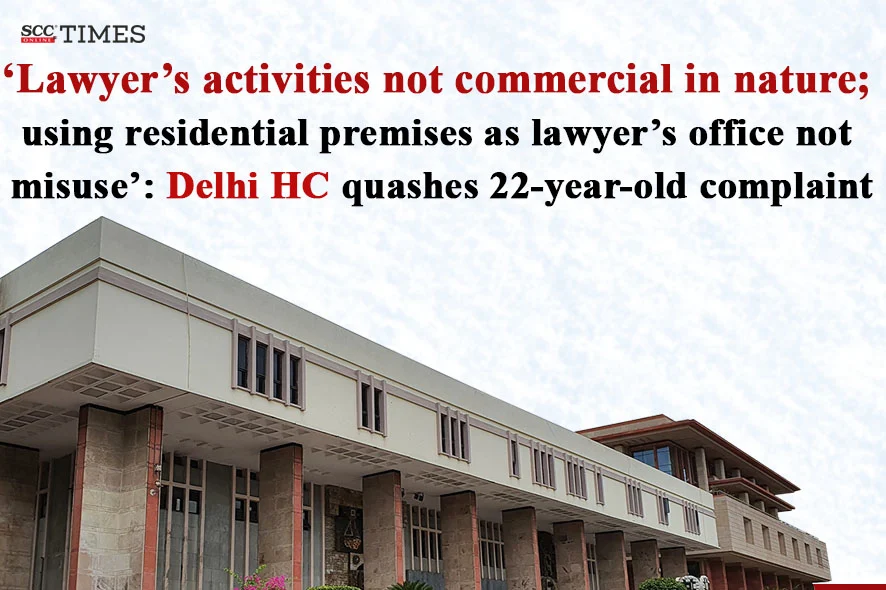Delhi High Court: The present petition was filed by a practicing advocate (‘petitioner’) under Section 482 of the Code of the Criminal Procedure, 1973 (‘CrPC’) for quashing of complaint under Sections 252 and 369(1) of the New Delhi Municipal Council Act, 1994 (‘NDMC Act’) alleging misuse of premises by running his office without permission from the Chairperson, NDMC.
A Single Judge Bench of Neena Bansal Krishna, J., held that classifying the activities of the petitioner as commercial activity was not only arbitrary but irrational and violative of Article 14 of the Constitution. Accordingly, the Court allowed the petition and held that there was no misuse of the premises by the petitioner, who had been running his office in terms of the Master Development Plan, 2001, (‘Master Plan’) read with Delhi Building Bye Laws, 1983.
Background
In the present case, the petitioner was alleged to have been misusing premises as he was carrying out commercial activity by running a lawyer’s office without permission from the Chairperson, NDMC. The petitioner submitted that the Metropolitan Magistrate had taken cognizance against the settled principles of law, and notice was issued erroneously to the petitioner.
The petitioner also contended that running a professional office did not qualify as commercial activity amounting to human habitation, in violation of Section 252 of the NDMC Act. On the other hand, the respondent argued that the basement was never intended to be used for residence but only for storage, while the petitioner was using it for human habitation by running his office there.
Analysis and Decision
The Court stated that the issue involved in the case at hand was “whether the legal services rendered by the office of a lawyer would amount to ‘commercial activity’ or not?”.
The Court specified that while a commercial activity involved investment of capital, profit and loss and co-operation of labor; on the other hand, the professional service of rendering advice in law was dependent upon one’s own academic qualification and individual skill. Thus, the Court stated that the said peculiar and distinctive features of the legal profession did not permit its inclusion in commercial or semi-commercial activity, establishment, or institution. Further, the Court classifying the activities of the petitioner as commercial activity was not only arbitrary but irrational and violative of Article 14 of the Constitution.
Considering the Inspection Report, the Court specified that the petitioner was running his ‘professional office’ to provide ‘professional services’ in law, from the basement of premises. Further considering Section 252 of the NDMC Act, the Court noted that there were certain restrictions on use of buildings and stated that in the present case, it was a residential building, the basement of which was being used as the office of the lawyer by the petitioner, and there was no other use of this property but human habitation.
After considering the Master Plan, the Court opined that the basement being used for professional activity was permitted under it. The Court emphasized that there was no dispute that the basement was constructed according to the Master plan and it could be used for commercial or office purposes. The Court held that in the present case, the same was being used as office of the lawyer only.
Thus, the Court opined that there was no misuse of the premises by the petitioner, who had been running his office in terms of Master Plan read with Delhi Building Bye Laws, 1983. Further, the Court stated that considering the nature of unsubstantiated allegations and that the case being pending for the last more than 22 years, it would be abuse of the process of the law and not serve any interest of justice, if such complaint was permitted to continue and choke the judicial system. Therefore, the Court allowed the petition and quashed the said complaint along with all consequential proceedings emanating therefrom.
[B. K. Sood v. North Delhi Municipal Corp., 2025 SCC OnLine Del 6365, decided on 8-10-2025]
Advocates who appeared in this case :
For the Petitioner: A. S. Chandhiok, Sr. Advocate with Tarranjit Singh Sawhney and Jasmeet Kaur Ajimal, Advocates
For the Respondent: Abhinav Bajaj, ASC with Saksham Ojha and Geetashi Chandna, Advocates




I, respectfully, do not agree with the judgment in as much as basements are meant as storage and the learned judge holding that lawyers books and files kept in the basement are stores. Moreover, learned judge holding that just because “lawyers” practice does not involve investment, it is not commercial activity. That way many services do not involve investment. Will they not fall under “Commercial Activity” category? Would CAs, Architects, Doctors fall under “commercial activity” or not? There are many other activities that do not require investments. Will such services be “Non-Commercial” activitues? Say Taro Cards Readers, Palmists, Dieticians. And I do not agree “Lawyers” do not require investment. What about setting up office, buying computers, buying ACs (it is mandatory to have basements air conditioned), buying books, installing phones and WiFI, office upkeep, office staff etc etc,
Basically, the learned judge was overawed from the fact the appeal was of 2005 and Criminal complaint was of even of earlier years. The learned judge could, without having gone into other details, allowed appeal on the ground it was too old, and the issue was too be proceeded against further.
If I remember in an earlier judgment DHC had held, lawyers practising in “chambers within Courts premises” is not commercial activity. This was when NDMC was charging electricity in lawyers chambers at commercial rates and not residential rates.
(I think appeals against such judgment are pending tough stet is operating).